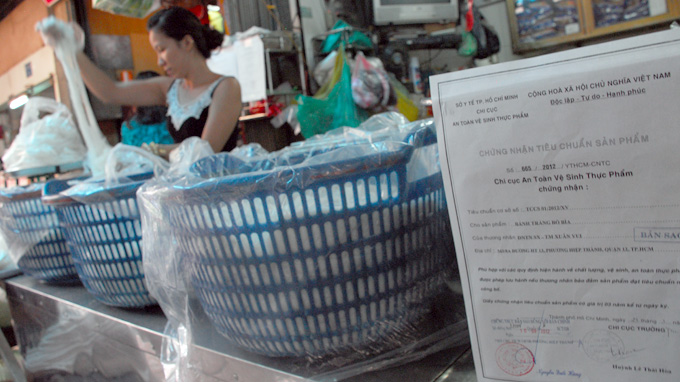At a time when contamination incidents related to almost every kind of food and vegetables are reported on a daily basis, food manufacturers and vendors are changing their business habits in order to win back trust from consumers, many of whom are turning to clean food to protect themselves.
Two weeks after the revelation about rice noodles contaminated with the toxic substance tinopal, small trader N.T. Hai always puts food safety certificates next to the bun and pho baskets at her booth in Thi Nghe market in Ho Chi Minh City.
This is to erase the customers’ fear over its quality, Hai said.
“I hope this can revitalize my plunging business,” she added.
The trader also asked her distributors to place stamps on the rice noodle packaging, another move made to build back a reputation.
She has good reason to do so.
“As news over toxic vermicelli is everywhere, none of my family members will eat bun now unless there is information about its origin and manufacturer,” Thu Hoai, a market-goer, said.
Other vendors find it hard to follow Hai’s lead, as they are only a small part of the distribution chain.
“My products are sourced from familiar suppliers and I cannot be sure about their origins,” Thuy, who sells vegetables at Cau market in Go Vap District, said.
Nguyen Kim Long, deputy manager of Hoang Hoa Tham market, said the management board has encouraged vendors to source products from trustworthy suppliers with adequate information about origin and quality.
The watchdog at Pham Van Hai market, meanwhile, conducted checks on traders’ stocks to ensure they meet safety standards.
Home-grown vegetables
With the list of food scandals continuously growing, many households in the city have switched to growing green products at home.
Nguyen Thi Thu Ha, based in District 1, said she is growing as many as 10 kinds of vegetables on her 40-square-meter terrace to serve her four-member family.
“It takes only 15 days from seeding to harvesting,” she said.
Most of the home-growers deploy hydroponics for their crops, a subset of hydroculture that grows plants using mineral nutrient solutions in water without soil.
Many seed providers and hydroponic consulting companies have embraced this golden chance.
Nguyen Thi Dao, director of seed-provider Gino Co, said she currently has more than 4,000 frequent customers, which has boosted annual revenues by 25 percent and led the company to increase seed imports by 40 percent.
Meanwhile, a representative of Saigon Thuy Canh (Saigon Hydroponic) Co said it receives some 200 customers on a monthly basis, who come to ask for advice on growing vegetables at home using the hydroponic method.




















































